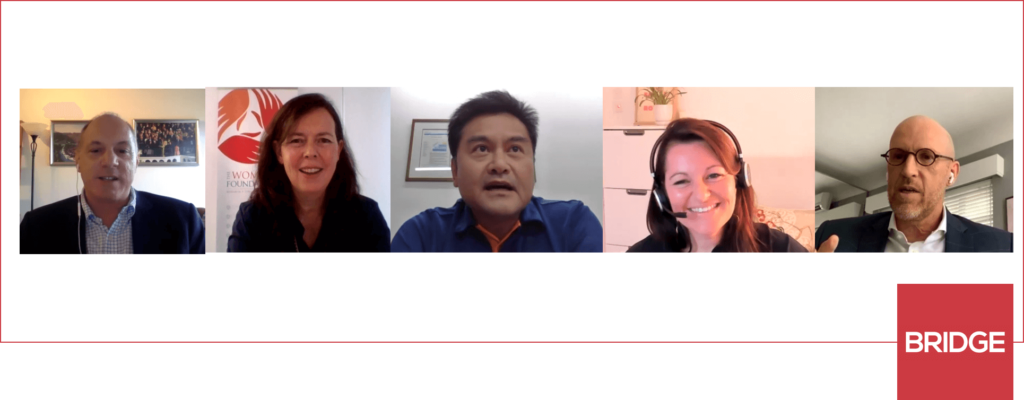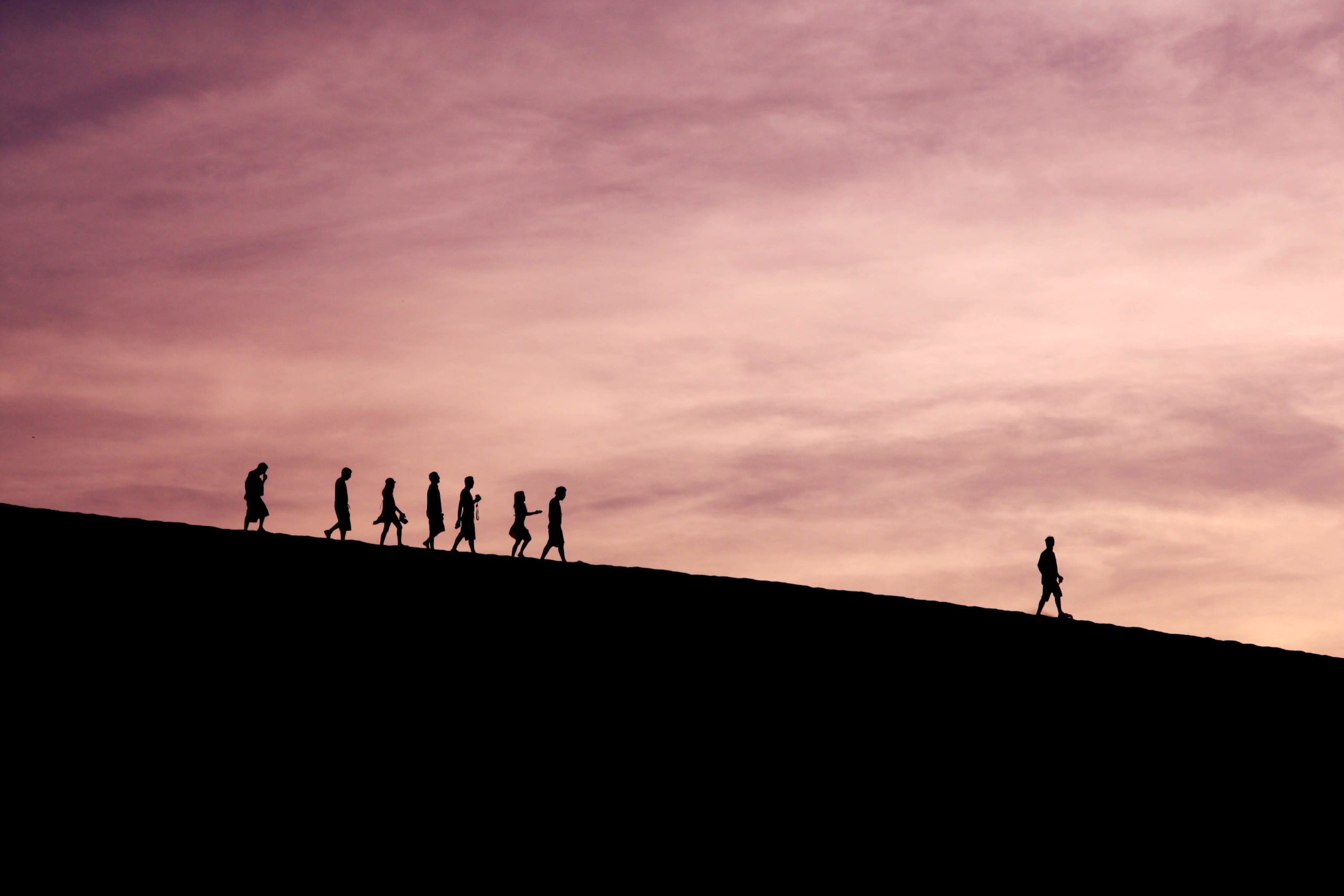Leadership for times of extraordinary change
With humanity being confronted with some of the most profound challenges of our times, the BRIDGE APAC team recently held a live exploration of the notion of societal leaders. Our BRIDGE Breakthrough Events are designed around thought leadership and creating a space for connection and learning. This experience explored how leaders are being called to lead differently during these times of extraordinary change.
The event opened its virtual doors to 60 leaders from around the world. Abigail Croft, Managing Director of BRIDGE Hong Kong and our moderator for the evening, opened the event. “Leaders can really make a difference, not just to bottom lines and their immediate community, but also to the world we all share. Everyone can be a leader and we believe a different kind of leadership is being called for”

The panellists
We were delighted to be joined by four incredible purpose-led leaders, with each panellist bringing wisdom, experience and insight to the exploration. Abigail began by asking them to share what they were learning about themselves and leadership.
Gordon Watson, CEO of AXA Asia and Chair of the Shared Value Project in Hong Kong, shared that despite a hugely intense time, his company has been brought closer together, with employees showing resilience and tenacity. “I see more humanity, more collective impact, more pivot than panic. Doing the right thing can be profitable. And that’s the concept of shared value – look at all your stakeholders. Make society better.”
“Crises are the crucible for transformation” stated Fiona Nott, CEO of the Women’s Foundation and Co-Founder of Room to Read’s Hong Kong Chapter. “So how do you get comfortable with the uncomfortable?” Fiona shared the importance of authenticity and human-ness during this time of growth and transformation, both in business and as human beings. “I see a lot of shifts happening in leadership, with people talking about things they’ve never spoken about before such as mental health and the role of leaders.”
Co-Owner and Group CEO of the Hong Broadband Network (HKBN), NiQ Lai, shared how they are providing broadband as a lifeline service in Hong Kong, helping those who are not able to afford it. He explained that with everything they do they have to be in start-up mindset. “Whenever we do something, we have to have a defined LUCA – a Legal Unfair Competitive Advantage. If we’re going to help on a social impact basis, we need to ask ourselves – what is the biggest impact that we can make?”
Henry De Sio, our fourth panellist, was Deputy Assistant to President Barack Obama and Chief Operating Officer in the 2008. He spent seven years as the Global Chair for Framework Change at Ashoka Innovators for the Public and is the global ambassador for changemakers. During the 2008 Obama campaign, they tapped into something that already exists in the DNA of humanity – an innovative mind, a service heart, an entrepreneurial spirit and a collaborative outlook. “My perspective was changed during the campaign. When you see everyone as a changemaker, that everyone is a leader, even if they are not leading, you take on a new type of leadership. If you are a teacher and you see changemakers coming into your classroom vs students, how would you change how you teach? If you are a CEO and you see changemakers coming into your retail stores rather than customers, how would you change your organisation? It all comes down to how you see the world and how you adjust your system to accommodate that.”
Q&A
As we moved into our Q&A, some interesting questions were posed. When creating change in a system, what is more critical for changemaker-companies to thrive – the stakeholders or the shareholders? For NiQ it was undoubtably the stakeholders. “Shareholders are just a small subset of stakeholders. You have to be successful to make change. Be humble in how you treat people but arrogant in your aspirations.” Gordon agreed, stating “for me it is about the stakeholders having a clear vision around what you want to do and the courage to go and do it, no matter what.”
So, how can we make the change we are seeing last? Henry and Fiona agreed there is no going back from this. Fiona shared “we’re in a period of global volatility. Culture change happens through individual actions and behaviour, even if that’s micro questions being asked. Day after day that changes things over time. I don’t think there is any going back from this.”
The power of your intention
At BRIDGE, we have a strong focus on the power of your intention. What is it that you want to lead for? But we also know that where you put your attention is very important. So how do we bridge the gap between your intention and the action you create. Abigail wrapped up the session asking each panellist the one thing that makes the biggest difference to their leadership impact.
For Gordon, it is fairness. “I truly believe in meritocracy. I work in an industry that wasn’t traditionally a meritocracy, but I want everyone in AXA to be everything they can be. If we can do that, we will create long-lasting change.”
NiQ brought us the metaphor of a bridge, asking what is the best way to build a large bridge safely and make it last? “You need to get the people who designed and built the bridge to live beneath it with their families. You take away the conflicts of interest, such as the bridge designer wanting to win design awards, or the construction company wanting to use the cheapest materials to increase their profit. There are so many conflicts of interest in running a company, but if you make everyone live under there then you create alignment. That is exactly how the co-ownership of HKBN works, with everyone taking ownership of the good and the bad.”
Fiona leads from her values. “People need to really understand their individual and organisational values. Once you’re clear on what you stand for you can change anything. I am trying to empower my community that what we are doing is bigger than the sum of its parts. This enables us to have exponential impact in a way that is respectful yet powerful.”
For Henry, it starts with young people. “They are the stakeholders of our future. How do we start preparing a generation to tackle the complex challenges that go with everyone leading in every moment, with all of the tools required to make lasting change?”
To leave a better world for generations to come, we need to embrace wholeheartedly an urgency to doing things differently. We need to act with a united force on a global scale and unleash resources not seen yet. This is a gigantic ask because no single person, company, stakeholder or government can achieve the breakthroughs alone. It takes new partnerships, new working relationships and new measures to win the race against time.
If you would like to discuss any of the topics raised by Leadership for Extraordinary Times, we’d love to hear from you.

